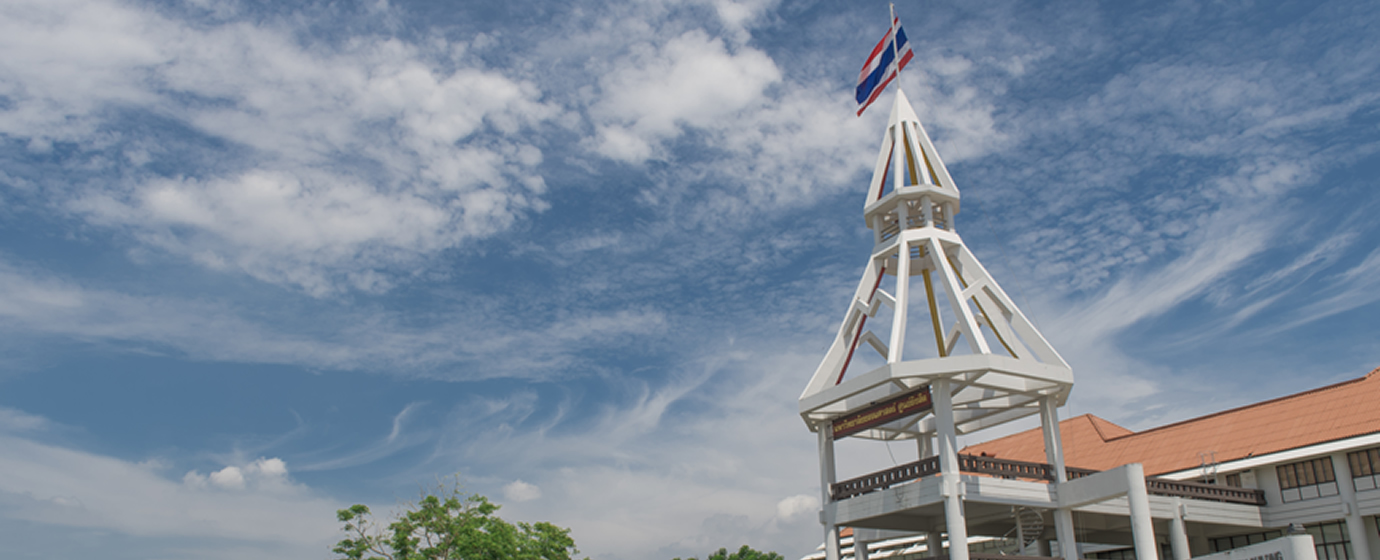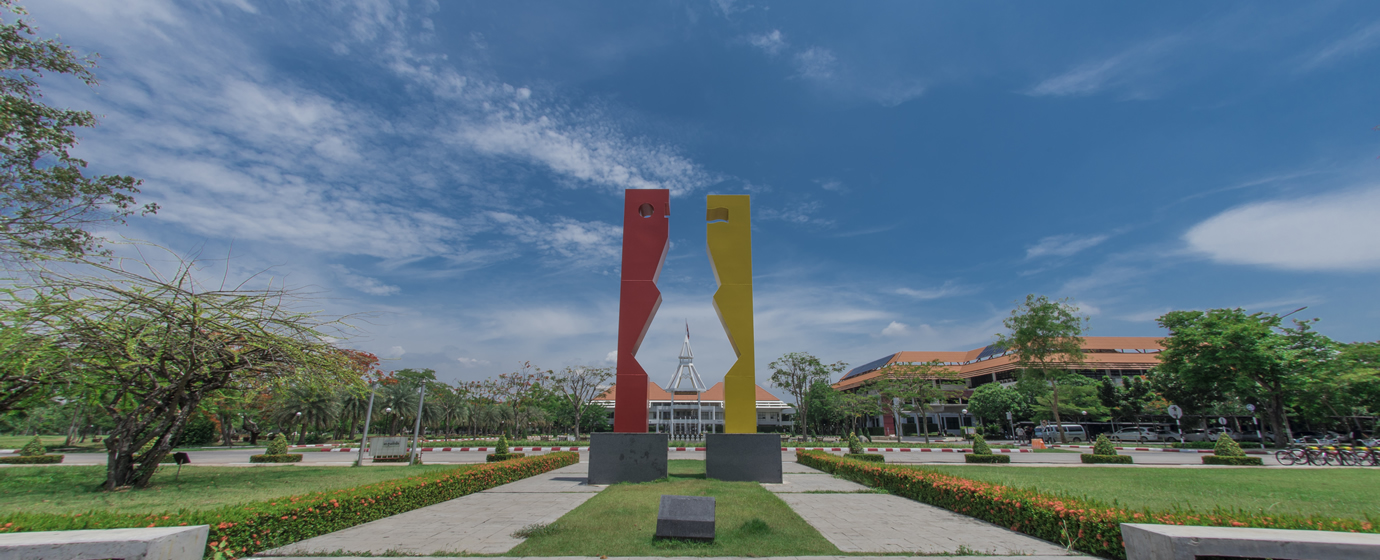HISTORY OF THE FACULTY OF ENGINEERING
Thammasat University initially had the vision to establish education in the fields of science and technology since 1968, as evidenced in the March 1978 proposal for the Thammasat University Development Project, which states: "On December 25, 1968, the Education Council issued a letter S.R. 0411 (1) informing that the matter regarding Thammasat University requesting assistance for undergraduate education in science and engineering, and planning for the construction of the university at Rangsit and Wang Na campuses, had been submitted to the Ford Foundation."
After 1968, the development of Thammasat University’s Rangsit campus continued, and professors were sent abroad for further studies in engineering. However, the political crises of October 14, 1973, and October 6, 1976, caused these projects to be delayed.
In 1988, under the leadership of Professor Krirkkiat Pipatseritham, then-President of Thammasat University, a proposal to establish the Faculty of Engineering was presented during the revision of the Sixth Education Development Plan. This proposal was approved by the University Council on August 26, 1988, and submitted to the Ministry of University Affairs on September 8, 1988. Concurrently, the Cabinet met on September 13, 1988, to discuss the establishment of regional universities, where it approved the upgrading of several provincial colleges to universities. The Cabinet also passed a resolution for the Ministry of University Affairs to consider proposing the establishment of the Faculty of Engineering and the Faculty of Medicine at Thammasat University for immediate Cabinet approval.
The proposal to establish the Faculty of Engineering passed the subcommittee for the Sixth Education Development Plan of the Ministry of University Affairs on December 13, 1988, and was further approved by the Ministry’s committee in July 1989. The Ministry then submitted a draft royal decree to establish the Faculty of Engineering to the Office of the Cabinet Secretary-General for further consideration, including input from the Budget Bureau and the Office of the Civil Service Commission. Eventually, the Cabinet approved the proposal in principle on June 20, 1989, and the draft royal decree was sent to the Office of the Council of State for legal review. The Cabinet Secretariat then forwarded it to the Royal Secretariat for royal approval, which was granted by His Majesty King Bhumibol Adulyadej on Saturday, August 19, 1989.
Thammasat University thus considers August 19, 1989, as the official founding date of its Faculty of Engineering.
Thammasat University then proceeded to develop its programs in science and engineering education during the final two years (1990-1991) of the Sixth Education Development Plan, aiming to produce engineers for societal and national service, in line with the government's policy of producing skilled personnel in engineering.
The university officially designates August 19, 1989, as the establishment date of the Faculty of Engineering, which became Thammasat University’s 10th faculty and the 9th public university engineering faculty in Thailand. Academic programs commenced in the 1990 academic year.
| Implementation | |
|---|---|
| 1990 | Admissions began for two programmes: Electrical Engineering and Industrial Engineering |
| 1991 | Admissions began for Civil Engineering Programme |
| 1993 | Admissions began for Chemical Engineering Programme |
| 1995 | Admissions began for Mechanical Engineering Programme |
| 1996 | Admissions began for the Twinning Engineering Programmes (TEP), allowing students to complete their education at both Thammasat University and the University of Nottingham in the UK. The fields represented were electrical, industrial, civil, chemical and mechanical engineering. |
| 1997 | Admissions began for the Master's degree programs in Industrial Engineering and Civil Engineering. |
| 2002 | Admissions began for the Bachelor of Engineering programme (English programme) in five disciplines: Electrical Engineering, Industrial Engineering, Civil Engineering, Chemical Engineering, and Mechanical Engineering. Accepting students for the Master's degree programme in two disciplines: Electrical Engineering and Chemical Engineering. Accepting students for the Doctoral degree programme in Civil Engineering. Launching the Computer Engineering programme |
| 2006 | Admissions began the Two-Institution Bachelor of Engineering Programme in collaboration with the University of New South Wales, Australia, in five disciplines: Electrical Engineering, Industrial Engineering, Civil Engineering, Chemical Engineering, and Mechanical Engineering. |
| 2008 | Launching Bachelor's-Master's programmes in Engineering and Business Management, and Master's-Doctoral programmes in Medical Engineering |
| 2011 | Launching the Integrated Bachelor and Master of Engineering Programme in Industrial Electrical Engineering. |
| 2013 | Launching the Bachelor of Engineering Programme in Automotive Engineering (English Programme) |
| 2014 | Launching the Bachelor of Engineering Programme in Software Engineering |
| 2018 | Establishment of the Bachelor’s Degree programmes in Vehicle Technology Engineering. |
The Faculty of Engineering, Thammasat University, Pattaya Campus, has expanded its educational offerings and established a training and seminar center in the region. It aims to seriously develop regional education centers to expand educational opportunities and bring academic excellence, Thammasat’s mindset, and its values into the communities of the Eastern region effectively. In 2014, the Faculty of Engineering, Thammasat University, Pattaya Campus, received financial support from Siam Motors Co., Ltd. to construct an Automotive Engineering Laboratory building with funding of 68 million baht, along with a support building (dormitory) with 30 million baht. Additionally, Siam Motors donated equipment for the Automotive Engineering Laboratory and provided scholarships to outstanding students in the Automotive Engineering programme
Faculty of Engineering,Thammasat University,Rangsit Campus
Thammasat School of Engineering (TSE)
His Majesty King Bhumibol Adulyadej signed the Royal Decree establishing the Faculty of Engineering on Saturday, August 19, 1989. Thammasat University, therefore, designated this date as the founding day of the Faculty of Engineering. It became the 10th faculty of Thammasat University and the 9th Faculty of Engineering among public universities in Thailand. Academic programmes began in the 1990 academic year. The Faculty is responsible for providing education, conducting research, applying research outcomes, and offering academic services.
| DEAN | **Prof. Dr. Sanya Mitaim** |
| Faculty Color | Maroon |
| Website | www.engr.tu.ac.th |
| Address |
|
Personnel Capacity
The Faculty of Engineering has 118 academic staff and 124 academic support staff. Among the academic staff, 109 hold doctoral degrees, accounting for 89%. The academic ranks are distributed as follows: 24 are Lecturers, 47 are Assistant Professors, 41 are Associate Professors, and 5 are Professors.
| Academin Title | Educational Qualifications | Total | |
| Master degree | Doctoral degree | ||
| Lecturer | 8 | 16 | 24 |
| Assistant Professor | 6 | 41 | 47 |
| Associate Professor | - | 41 | 41 |
| Professor | - | 5 | 5 |
| Total | 14 | 104 | 118 |
Our Curriculum
Regular Programme
We offer instruction in Thai over four years at the Rangsit Center, with courses available in the following five departments:
- Department of Electrical and Computer Engineering
- Department of Mechanical Engineering
- Department of Chemical Engineering
- Department of Civil Engineering
- Department of Industrial Engineering
For more information, click here.
International Programme; English programme
2.1 Dual-Institution Bachelor of Engineering Programme (TEP: Twinning Engineering Programmes)
The Faculty of Engineering began offering the Twinning Engineering Programmes (TEP), which is an Englishlanguage curriculum.
This programme was established through an academic collaboration between the Faculty of Engineering at Thammasat University and The University of Nottingham, UK, in 1996. Students enrolled in this program are required to complete their first and second years at Thammasat University and then proceed to study in the UK for their third and fourth years. Upon graduation, they receive a Bachelor of Engineering (B.Eng.) degree from Thammasat University and a Bachelor of Engineering from The University of Nottingham.
In 2006, the Faculty of Engineering expanded this collaborative programme to include UNSW Sydney in Australia. Most recently, in 2017, collaboration was further extended to KU Leuven in Belgium. Students enrolled in the TEP programme can now choose the overseas university they wish to attend. Before proceeding to study abroad in their third and fourth years, students must undergo a reassessment of their academic performance and foreign language communication skills according to the criteria set by each university.
2.2 Bachelor of Engineering Programme in English, Faculty of Engineering (TEPE: Thammasat English Programme of Engineering)
In 2002, the Faculty of Engineering at Thammasat University launched the Bachelor of Engineering programme in English, a four-year course offered in various disciplines, including Chemical Engineering, Civil Engineering, Electrical Engineering, Industrial Engineering, Mechanical Engineering, and Automotive Engineering. This programme is similar to the TEP program but with lower tuition costs. Additionally, the TEPE programme has expanded its collaboration to support and promote student exchange programmes with universities abroad. Furthermore, the TEPE program offers 30 scholarships, including 20 full scholarships and 10 partial scholarships.
Engineering Innovation Programme (TU-PINE) The programme offers instruction in Thai.
The Faculty of Engineering at Thammasat University recognizes the necessity of integrating diverse bodies of knowledge into engineering curricula. As a result, the Programme of Innovative Engineering (TU-PINE) was established to develop and manage integrated curricula. This program offers undergraduate courses in Thai across the following four disciplines:
Civil Engineering and Construction Management (EBM)
- Duration: 4 years at Thammasat University's Rangsit campus
- This programme is a collaboration between the Faculty of Engineering and the Faculty of Commerce and Accountancy. It provides new opportunities for students interested in both engineering and management, addressing the needs of the industrial and business sectors.
Industrial Power and Electrical Engineering (iPEN-iEE)
- Duration: 4 years at Thammasat University's Rangsit campus
- This is the first programme in Thailand to integrate electrical engineering with industrial engineering, catering to the specific demands of the industrial sector. The curriculum develops engineers with expertise in both electrical and industrial engineering.
Software Engineering (Soft-en)
- Duration: Year 1 at Thammasat University's Rangsit campus + Years 2-4 at Thammasat University's Pattaya campus
- This programme focuses on producing high-quality software engineers proficient in both theoretical and practical aspects. The curriculum emphasizes hands-on learning, enabling students to design, develop, and ensure software quality effectively. Additionally, the courses include business concepts to prepare graduates for creating software-related businesses.
Automotive Technology Engineering (V-TECH)
- Duration: 4 years at Thammasat University's Pattaya campus
- This is one of Thammasat University's new programmes, emphasizing experiential learning through integration with real-world work in modern automotive manufacturing. The programme is designed to meet the workforce needs of Thailand's new S-curve industries, particularly the modern automotive industry. Students will also intern with automotive manufacturers and assemblers such as Siam Motors, Toyota, Triumph, etc.

